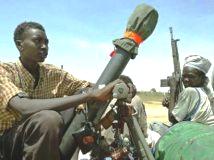Darfur peace talks start amid new fighting
By Silvia Aloisi
ABUJA, Oct 25 (Reuters) – Darfur peace talks kicked off four days late in Nigeria on Monday amid mounting international concerns of a resurgence of fighting in the remote Sudan region.

|
|
Members of Sudanese Liberation Army ride on a truck at Ashma village 30 km (19 miles) from Nyala, south Darfur, October 6, 2004. |
Previous talks between the Sudanese government and rebels dragged on for three weeks only to collapse with no agreement, but pressure is mounting on both sides to ease the plight of 1.5 million civilians displaced by the conflict.
“This time people are more willing to discuss,” said Jan Pronk, the U.N. secretary-general’s special representative in Sudan.
Each side accused the other of breaking a ceasefire as talks began in the Nigerian capital after a delay due to a transport mix-up left rebel negotiators stranded across the continent for up to four days.
“They are already preparing for war,” said Ahmed Mohammed Tugod, chief negotiator for JEM, one of two rebel groups present, who accused the government of “systematic bombardment” in the Allaiet area of eastern Darfur.
Government spokesman Ibrahim Mohammed said rebels were the first to attack in Allaiet and troops retaliated, adding that the government was complying with the ceasefire terms.
To complicate matters, two more rebel factions have emerged in Darfur, AU and United Nations officials in Abuja said.
European Union foreign policy chief Javier Solana said on Sunday he was increasingly worried by the renewed fighting and said a break in the ceasefire would be difficult to fix.
The EU has promised more than $100 million to fund an extra deployment of 3,000 African Union ceasefire monitors to Darfur, which AU officials said was now due to begin on Thursday after a delay that contributor Rwanda blamed on poor logistics.
“We have told the Nigerians that their troops will be deployed on the 28th of October and the Rwandese on the 30th of October and that is what is going to happen,” AU commissioner for peace and security Said Djinnit told Reuters.
There are currently only 300 AU soldiers in Darfur protecting 150 AU observers monitoring a shaky truce in an area the size of France.
MILITIAS
Two rebel groups launched a revolt in western Sudan in early 2003 after years of skirmishes between mainly African farmers and Arab nomads over land. They accuse the government of arming Arab militias, known as Janjaweed, to crush them and their civilian sympathisers, a charge Khartoum denies.
The United Nations estimates 70,000 people have died from malnutrition and disease in the last seven months alone.
It is investigating if the campaign of killing, rape and looting by the Janjaweed militias constitutes genocide, as Washington says, and has threatened to impose sanctions on Khartoum if it does not stop the violence and disarm the militias.
African Union mediators said their first hurdle would be to persuade both sides to sign a humanitarian protocol drawn up at the last round of talks to allow more aid to the refugees.
Rebels have previously said they would only sign it once they have also agreed on security issues.
Some observers of the Abuja talks say both sides have an interest in dragging out the peace process.
Rebels want more international pressure on Khartoum, while the government aims to limit condemnation by showing its willingness to negotiate in the hope the world’s attention will fade away, they say.
“We are trying to instil a sense of urgency here because the situation in Darfur is not getting better, it’s getting worse and that should be a concern for all of us,” said Sten Rylander, a mediator from the Swedish Foreign Ministry.
